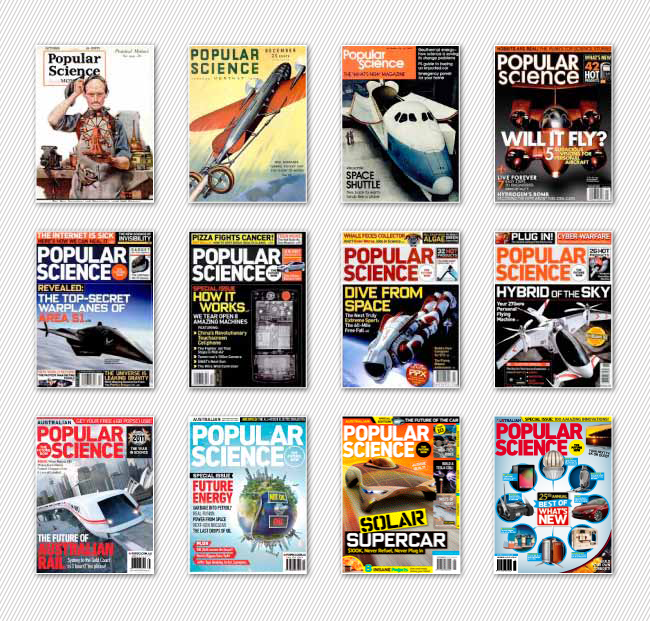
The World's Oldest Science and Technology Magazine
For nearly 140 years, Popular Science has been the "what's next" magazine. We've covered every major technological breakthrough from 1872 to 2012.
Electric light? Check. Powered flight? Check. Space Shuttle? Of course. The rise and fall of nuclear power? Yes. Flying cars? Constantly.
Popular Science – PopSci to our friends – is a pioneer of the magazine as an information delivery technology. Our first editions, way back in 1872, might have looked like broadsheet newspapers, but the content has always been the same: the tech that's being talked about today, and built tomorrow.
PopSci in the 20th Century
Our role in the 20th Century was to keep readers excited about the constant barrage of new technology. Every issue hinted at something amazing, just around the corner.
Soon we'll have those flying cars, we'd say. Soon you'll take a roast dinner in a pill. Soon you'll book a trip to Mars.
Popsci in the 21st Century
Today, we LIVE the future that PopSci used to write about back in the 1960s. Our technology is more complex – and morally nuanced – than ever. So now PopSci's role is to help you make sense of that constant barrage of technology, which far from easing off, is actually intensifying.
The mainstream news media has adopted an almost new Luddism in its coverage of technology – not gadgets, we know the papers love gadgets – but the big projects, big engineering and big science. There's a constant air of negativity, a suggestion that every big project is out to destroy the planet or is a waste of taxpayer dollars. It's never about the tech itself.
PopSci reports on technology for what it is, what it does, and how it stands to improve the world. We're less interested in the political fallout from a windfarm, and more about how the turbines actually generate electricity.
PopSci and DIY
But this magazine has never been exclusively about new, expensive tech. We're also champions of human ingenuity. After all, fundamentally, there's no different between an engineer working for Boeing and a bloke in his shed working out how to build his motorbike a turbine engine using a turbo from an old Saab.
We celebrate backyard and garage inventors, and dig in to complex and quirky DIY projects.
Some people say that in a world where you can get an Android tablet for $75, DIY is dead. We say it's a world where you can add a touchscreen controller to your home lighting system for $75 and a bit of head-scratching.
Celebrating Technology
At the end of the day, PopSci is a magazine for technologists. We don't think that all technology is perfect, or that technology hasn't done great damage to the world. But we believe the answer to a bad machine is to build a better machine.
Humans are builders and makers. And for 140 years, Popular Science has celebrated that. It's kind of a habit. We're not going to stop now.

EDITOR'S PICKS







